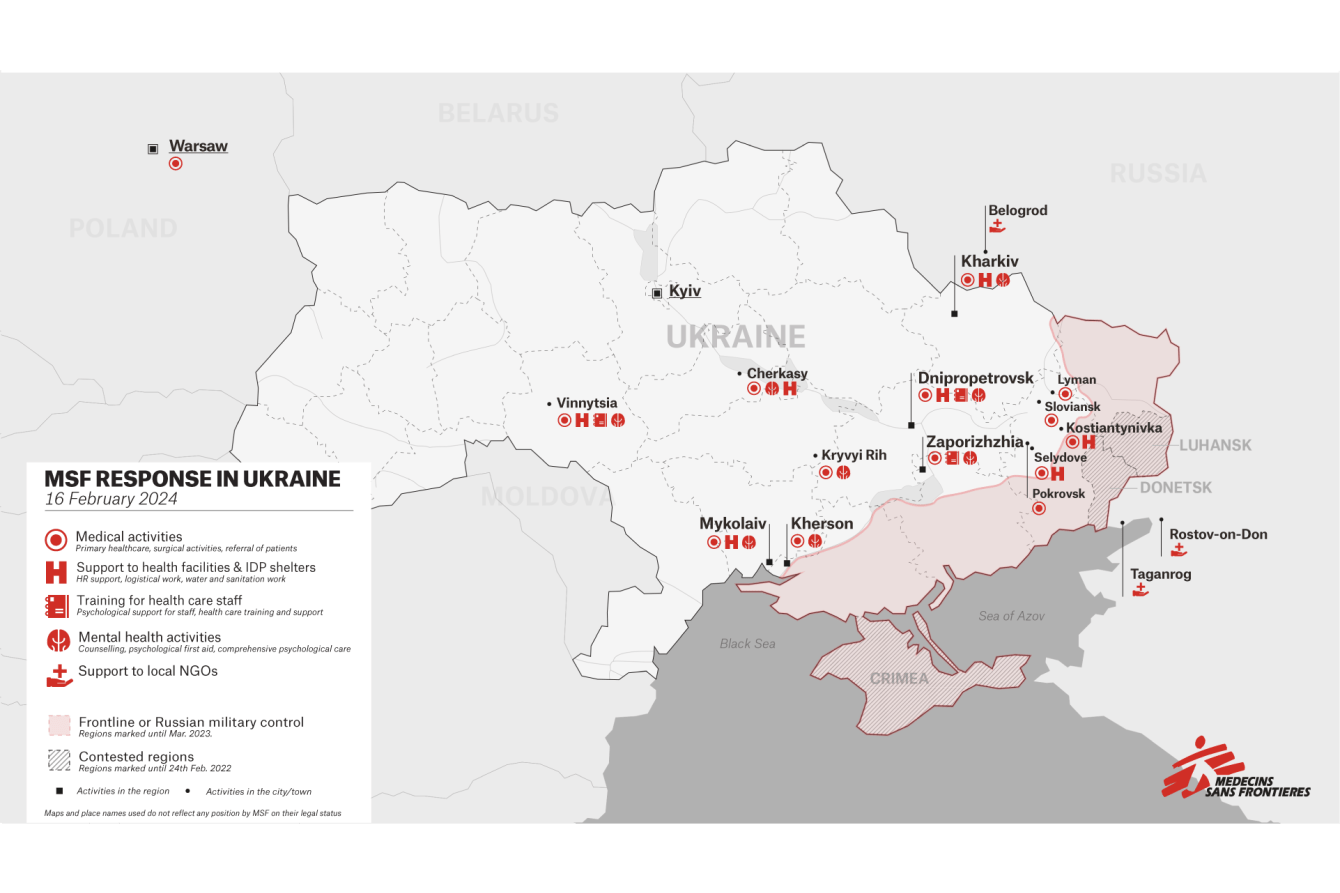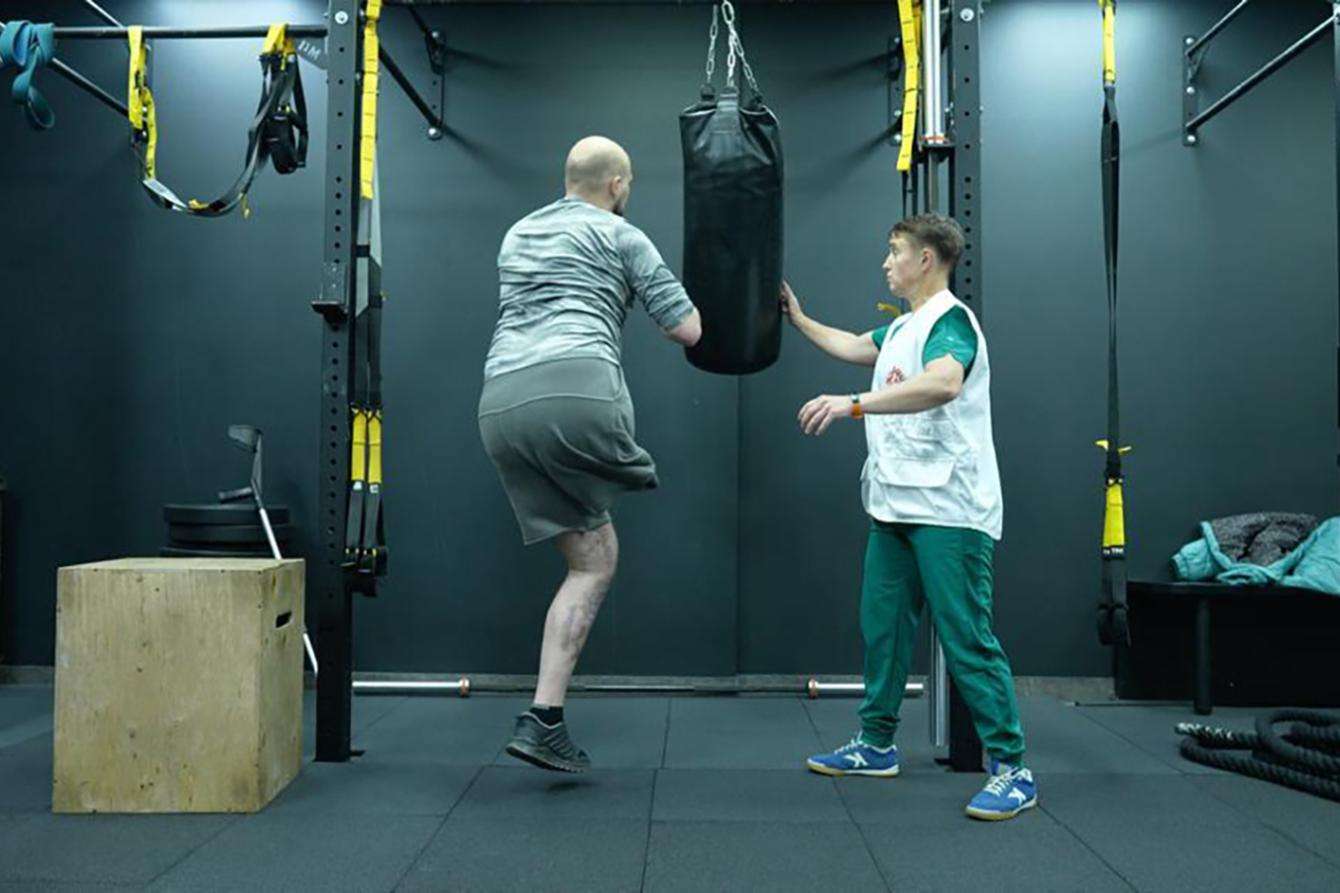February 24 marks two years since Russia escalated the war in Ukraine, after years of hostilities beginning in 2014. Today, nearly 10 million people are displaced, including 3.7 million internally displaced people and 5.9 million refugees abroad. Missile and drone attacks continue and the frontline spans more than 600 miles.
In recent months, Doctors Without Borders/Médecins Sans Frontières (MSF) has adapted, reduced, and halted some activities, particularly in more stable areas of Ukraine. We focus today on the provision of medical care in areas that have been affected by the conflict, including mental health, physiotherapy, and referrals of critical patients.
With over 350 staff in the country working predominantly in the south and east, our response includes:
- Mobile clinic teams are providing primary health care, mental health counseling, and psychoeducation services, as well as sexual and reproductive health care, particularly in areas close to the frontlines.
- Medical donations, including medical kits, equipment, and medicine for hospitals and medical facilities with shortages.
- Training for health care staff on secondary health care, including psychiatric care, mass casualty response, and mental health.
- Physiotherapy, post-surgery care, and psychological support for war-wounded and injured patients, as well as physiotherapy training for staff in rehabilitation wards at hospitals supported by MSF teams.
- Supporting emergency care and intensive care units and surgical capacity at hospitals near the frontlines in Donetsk and Kherson regions.
- Medical referrals and evacuations through ambulances, mobile clinics, and the MSF medical train.

Ukraine crisis response: By the numbers
- 12,724 mental health consultations (not including group sessions)
- 59,567 primary health consultations
- 3,806 sexual and reproductive health consultations
- 1,991 emergency room consultations
- 429 surgical interventions assisted or performed by MSF
- 588 patients admitted to ER due to violent trauma
- 10,543 patient referrals via ambulance
- 57 percent of patients with violent trauma via ambulance
- 137 trips via medical train
- 3,808 medical train patients
- 310 ICU wagon patients on the medical train
*In 2023
**From March 38 through October 2023
- 4,393 physiotherapy sessions
- 292 physiotherapy patients
- 778 counseling sessions
- 237 patients with PTSD

Mobile clinics in Ukraine
The war in Ukraine has had a devastating impact on the continuity of care for people with pre-existing conditions, such as diabetes and hypertension, and the mental health of people who have experienced fear, isolation, and fighting, whether displaced or still living near the front lines. With thousands of internally displaced people living across Ukraine in shelters, a lack of health care staff, and destroyed health facilities near the front lines, the war has severely disrupted people’s access to care.
To ensure continuity of care and to respond to emerging mental health needs in the Ukraine crisis, MSF mobile clinic teams consisting of psychologists, doctors, and health promoters support patients and communities by providing medical and psychological consultations, medical and non-medical donations, and increasing the capacity of the health care system by reconstructing health facilities and training health care staff.
In regions heavily affected by the fighting, such as Donetsk, Kherson, and Mykolaiv regions—especially in areas near the front lines—most of our mobile clinic patients are elderly people who are either unwilling or unable to leave their homes. MSF doctors have consistently seen a high prevalence of chronic illnesses such as hypertension, diabetes, heart disease, and epilepsy—many of which can have long-term health consequences and require continuous care. Through our mobile clinics in Kherson and Mykolaiv, we have also begun screening for tuberculosis.

Emergency rooms, intensive care, and surgical interventions in Ukrainian cities
Near the eastern and southern frontline areas in Ukraine, people are experiencing incredible hardship as daily shelling and fighting persist. MSF teams are seeing patients with traumatic injuries from shelling, bombing, and shrapnel blasts. As health facilities cope with emerging and increased needs, patients injured in car accidents or those with non-communicable diseases (for example, cardiovascular emergencies) are still prevalent.
An MSF medical team supports surgical and trauma activities in the city of Kherson. From July 2022 until December 2023, MSF supported Kostiantynivka Hospital, where our teams set up an emergency department, added two beds to the ICU, and one operating room on the ground floor to run a contingency trauma facility. However, given the continued shelling of Kostiantynivka, there is no longer a constant MSF presence there. A mobile emergency response team for mass casualty incidents remains ready to respond in both Kostiantynivka and Selydove.
Most patient admissions have been related to violent trauma. In 2023, 17 percent of patients coming into MSF-supported emergency departments in Kostiantynivka and Kherson were deemed to be “red cases,” meaning they were in life-threatening condition and required a treatment window within 30-60 minutes of first medical contact.
The MSF team aims to alleviate the burden on the Ukraine health care system, specifically on trauma centers, by triaging and stabilizing patients. Our staff assess a patient’s needs, determine the urgency, and depending on the needs, stabilize and refer them to the inpatient department for emergency damage-control surgery, or to other Ministry of Health hospitals.

Ukraine hospital evacuations and referrals
MSF runs a medical evacuation train and ambulances to evacuate patients from overburdened Ukrainian hospitals close to the front lines so they can receive care at safer hospitals with more capacity elsewhere in the country. Due to shifting dynamics between regions due to the war, our activities aboard the medical train have wound down. We also transport patients in critical condition using our 15 ambulances.
Given the continued strain on Ukraine’s health care system, and with a continued flow of patients needing referrals due to trauma injuries related to violence (especially in the Donetsk, Kherson, Dnipropetrovsk, and Zaporizhzhia regions), MSF ambulance teams refer patients to other hospitals where patients can receive appropriate care. The health care system is struggling to cope with both existing and emerging medical needs caused by the fighting near the front lines in the east and south.

Rehabilitation: Physiotherapy and psychological care
A huge number of people have suffered severe injuries caused by the war in Ukraine. Without adequate, early post-surgical treatment, their recovery may remain incomplete or take much longer than necessary, affecting their lives and weighing on an overwhelmed system.
MSF teams are supporting the Ukrainian health care system with specialization and by providing training in physiotherapy and post-operative care, as well as psychological consultations. Rehabilitation and mental health services were not particularly developed in the health care system prior to the war, but now there are a huge number of people with major injuries and the need for post-operative care is enormous. The trauma patients we see are at risk of developing long-term medical problems or permanent disabilities without proper care.
MSF teams have provided physiotherapy training to staff involved in the physical rehabilitation of war-wounded patients throughout Ukraine, however recently, our only training program is at a hospital in Kharkiv city.
MSF also runs an early rehabilitation project for war-wounded patients in the Cherkasy and Zhytomyr regions. In the Ministry of Health’s hospital in Cherkasy, the team supports incoming war-wounded patients using a multidisciplinary approach with physiotherapy, psychological care, and nursing. We also provide training and technical support to hospitals in Zhytomyr.

PTSD: Comprehensive psychological care for post-traumatic stress
In 2023, MSF started providing specialized psychotherapeutic services for people experiencing war-related post-traumatic stress disorder (PTSD) symptoms in Vinnytsia. A newly custom-designed mental health center was opened in September this year.
MSF offers psychological sessions for both individuals and members of the patient support network. Our specialists provide patients with techniques to help reduce and prevent worsening symptoms, increase coping skills, improve interpersonal functionality, and alleviate the consequences of traumatic stress.
A specially trained mental health promotion team is responsible for community engagement and mobilization through partnerships with key organizations and other health providers in Vinnytsia city. In addition, we train relevant staff (including medical doctors, psychologists, and social workers) in partner organizations and medical staff in primary health care centers.

Other MSF activities in the Ukraine crisis
Tuberculosis
In the northwest of Ukraine, MSF’s tuberculosis (TB) project in Zhytomyr, which ran for five years, has closed. At the end of 2023, the Biosafety Level 3 Lab was handed over to the Ministry of Health. However, in Kherson and Mykolaiv regions, MSF continues some TB activities, providing screenings of suspected TB cases through mobile clinics.
Donations
Since the beginning of 2023, MSF has made more than 624 donations amounting to more than $2 million including medicines, medical consumables and equipment, hygiene kits, and blankets.
During the same period, MSF made 197 medical donations amounting to around $1 million to 100 health facilities in the region of Poltava, Sumy, and Kharkiv in the northeast; Ivano-Frankivsk and Zakarpattia in the west; Kirovohrad, Zhytomyr, and Kyiv in the central part of the country; and Mykolaiv and Kherson in the south.
Also in 2023, MSF made donations in Lviv and the eastern and southern regions on the front line, amounting to more than $621,000. We also donated more than $48,000 in supplies and spent more than $73,000 in construction costs on health care structures.
Training
Between the start of 2023 and January 2024, MSF provided training for medical professionals and specialists on mental health and physiotherapy in the regions of Poltava, Kharkiv, Kirovohrad, and Mykolaiv, reaching nearly 3,000 people.




